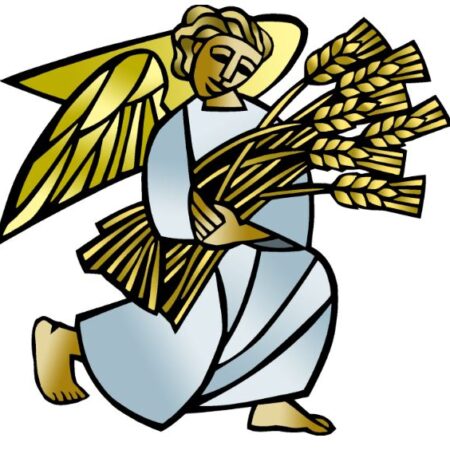Judgment and Mercy
The sermon will be a post on our Facebook page. Please click on link to view sermon.
Matthew’s gospel knows little compromise: sheep or goats, wheat or weeds, good or evil. Finding the good news of God’s love for all people, for all creation, can be a challenge in this book. Today’s gospel is no exception. Jesus interprets a parable for the disciples; he announces that all evildoers will be thrown into the furnace of fire, while the righteous will shine like the sun. The “Son of Man” will judge the world. Matthew’s phrase “for the kingdom of heaven may be compared to . . .” occurs here for the first time in this gospel. Jesus’ parable is a genuine metaphor—it is best viewed as a whole with no point-by-point comparison. The kingdom of believers has the same potential as those of the world to do good and to do evil. Jesus’ allegorical interpretation encourages believers to strive for righteousness, and emphasizes God as judge.
St. Paul, however, in his letter to the church at Rome focuses on God as merciful judge. He proclaims that all creation will be freed from decay and receive redemption. Paul reminds us our hope lies with God, our parent through a spirit of adoption. This dichotomous picture of God as judge and giver of mercy began with last Sunday’s texts and evidences itself in readings from Romans and Matthew across the next four Sundays. In some cases the God of mercy is highlighted in Paul’s letter, at other times in the gospel. This good news, however, is always present!
The exercise of judgment and mercy reflects God’s emphasis on justice over fairness. A fair God condemns those who do evil. A just God moves beyond fairness to justice, peace, and reconciliation. As evil doers, sinners, one and all, we are grateful for God’s justice towards us and all people.
Gospel: Matthew 13:24-30, 36-43
Jesus tells a parable about the coexistence of good and evil in this world. God’s judgment will remove all evildoers and causes of sin, but not until the end of human history.
24[Jesus] put before [the crowds] another parable: “The kingdom of heaven may be compared to someone who sowed good seed in his field;25but while everybody was asleep, an enemy came and sowed weeds among the wheat, and then went away. 26So when the plants came up and bore grain, then the weeds appeared as well. 27And the slaves of the householder came and said to him, ‘Master, did you not sow good seed in your field? Where, then, did these weeds come from?’ 28He answered, ‘An enemy has done this.’ The slaves said to him, ‘Then do you want us to go and gather them?’ 29But he replied, ‘No; for in gathering the weeds you would uproot the wheat along with them. 30Let both of them grow together until the harvest; and at harvest time I will tell the reapers, Collect the weeds first and bind them in bundles to be burned, but gather the wheat into my barn.’ ”
36Then he left the crowds and went into the house. And his disciples approached him, saying, “Explain to us the parable of the weeds of the field.” 37He answered, “The one who sows the good seed is the Son of Man; 38the field is the world, and the good seed are the children of the kingdom; the weeds are the children of the evil one, 39and the enemy who sowed them is the devil; the harvest is the end of the age, and the reapers are angels. 40Just as the weeds are collected and burned up with fire, so will it be at the end of the age. 41The Son of Man will send his angels, and they will collect out of his kingdom all causes of sin and all evildoers, 42and they will throw them into the furnace of fire, where there will be weeping and gnashing of teeth. 43Then the righteous will shine like the sun in the kingdom of their Father. Let anyone with ears listen!”
